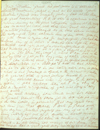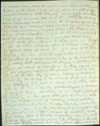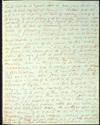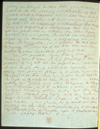Mahatma Letter No. 33
| Quick Facts | |
|---|---|
| People involved | |
| Written by: | Morya |
| Received by: | A. P. Sinnett |
| Sent via: | unknown |
| Dates | |
| Written on: | unknown |
| Received on: | December 1881 - see below. |
| Other dates: | unknown |
| Places | |
| Sent from: | unknown |
| Received at: | Allahabad, India |
| Via: | unknown |
This is Letter No. 33 in The Mahatma Letters to A. P. Sinnett, 4th chronological edition. It corresponds to Letter No. 38 in Barker numbering. See below for Context and background.
< Prev letter chrono
Next letter chrono >
< Prev letter Barker
Next letter Barker >
Cover sheet
|
From M. Miscellaneous letters received at Allahabad January, February 1882 |
|
NOTES: |
Page 1 transcription, image, and notes
|
Your "illustrious" friend did not mean to be "satirical," whatever other construction might be put on his words. Your "illustrious" friend was simply feeling sad at the thought of the great disappointment K.H. is sure to experience when he returns among us. The first retrospective glance at the work he has so much at heart, will show him such samples of mutual feeling exchanged as the two herein enclosed. The undignified, bitter, sarcastic tone of one will give him as little cause to rejoice as the undignified, foolish and childish tone of the other. I would have left the subject untouched had you not so misunderstood the feeling that dictated my last. It is better I should be frank with you. The term "Highness" to which I am not in the least entitled is far more suggestive of satire than anything I have hitherto said. Yet as "no epithet will hang to the shirt-collar of a Bod-pa" I heed it not advising you to do the same and see no satire where none is meant and which is but frankness in speech, and the correct definition of the general state of your feelings toward the natives. Your solicitor knows better — of course. If the paragraph in question is not libellous then all I can say is, that a complete re-codification of your libel law is very much needed. You will certainly have trouble with her about the "female branch." Her scorn for the sex — has no bounds and she can hardly be persuaded that any good can ever come from that quarter. I will be frank with you again. Neither myself nor any of us — K.H. being entirely left out of the question — would consent to become the founders, let alone the conductors of a female branch — we all having had enough of our Anis. Yet we confess that a great good may result of such a movement, |
NOTES:
|
Page 2
|
the females having such an influence over their children and the men in the houses, you being such an old and experienced hand in that direction could with Mr. Hume's help be of immense use to K.H., from within the area of whose "loveable nature," with the exception of his sister — females were always excluded and love for his country and humanity reigned alone. He knows nothing of the creatures — you do. He always felt the need of enrolling women — yet would never meddle with them. There's a chance for you to help him. On the other hand we claim to know more of the secret cause of events than you men of the world do. I say then that it is the vilification and abuse of the founders, the general misconception of the aims and objects of the Society that paralyses its progress — nothing else. There's no want of definitiveness in these objects were they but properly explained. The members would have plenty to do were they to pursue reality with half the fervour they do mirage. I am sorry to find you comparing Theosophy to a painted house on the stage whereas in the hands of true philanthropists and theosophists it might become as strong as an impregnable fort. The situation is this: men who join the Society with the one selfish object of reaching power making occult science their only or even chief aim may as well not join it — they are doomed to disappointment as much as those who commit the mistake of letting them believe that the Society is nothing else. It is just because they preach too much "the Brothers" and too little if at all Brotherhood that they fail. How many |
NOTES: |
Page 3
|
times had we to repeat, that he who joins the Society with the sole object of coming in contact with us and if not of acquiring at least of assuring himself of the reality of such powers and of our objective existence — was pursuing a mirage? I say again then. It is he alone who has the love of humanity at heart, who is capable of grasping thoroughly the idea of a regenerating practical Brotherhood who is entitled to the possession of our secrets. He alone, such a man — will never misuse his powers, as there will be no fear that he should turn them to selfish ends. A man who places not the good of mankind above his own good is not worthy of becoming our chela — he is not worthy of becoming higher in knowledge than his neighbour. If he craves for phenomena let him be satisfied with the pranks of spiritualism. Such is the real state of things. There was a time, when from sea to sea, from the mountains and deserts of the north to the grand woods and downs of Ceylon, there was but one faith, one rallying cry — to save humanity from the miseries of ignorance in the name of Him who taught first the solidarity of all men. How is it now? Where is the grandeur of our people and of the one Truth? These, you may say, are beautiful visions which were once realities on earth, but had flitted away like the light of a summer's evening. Yes; and now we are in the midst of a conflicting people, of an obstinate, ignorant people seeking to know the truth, yet not able to find it for each seeks it only for his own private benefit and gratification, without |
NOTES: |
Page 4
|
giving one thought to others. Will you, or rather they, never see the true meaning and explanation of that great wreck and desolation which has come to our land and threatens all lands — yours first of all? It is selfishness and exclusiveness that killed ours, and it [is] selfishness and exclusiveness that will kill yours — which has in addition some other defects which I will not name. The world has clouded the light of true knowledge, and selfishness will not allow its resurrection, for it excludes and will not recognise the whole fellowship of all those who were born under the same immutable natural law. You are mistaken again. I may blame your "curiosity" when I know it to be profitless. I am unable to regard as an "impertinence" that which is but the free use of intellectual capacities for reasoning. You may see things in a false light and you do often so see them. But you do not concentrate all the light in yourself as some do, and that's one superior quality you possess over other Europeans we know. Your affection for K.H. is sincere and warm and that is your redeeming quality in my eyes. Why should you then await my reply with any "nervousness" at all. Whatever happens we two will ever remain your friends, as we would not blame sincerity even when it is manifested under the somewhat objectionable form of trampling upon a prostrated chela — the hapless Babu. Yours, |
NOTES: |
Context and background
Physical description of letter
The original is in the British Library, Folio 3. According to George Linton and Virginia Hanson, the letter was written:
In red ink on both sides of two sheets of letter-size white paper. This letter is difficult to read.[1]
Publication history
Commentary about this letter
Notes
- ↑ George E. Linton and Virginia Hanson, eds., Readers Guide to The Mahatma Letters to A. P. Sinnett (Adyar, Chennai, India: Theosophical Publishing House, 1972), 83.




